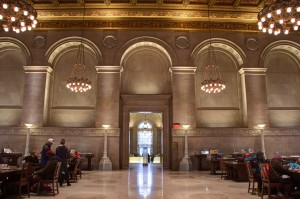David Attenborough Describes Curling
Human animals have many techniques for survival, and curling is apparently one of them. David Attenborough narrates.
Human animals have many techniques for survival, and curling is apparently one of them. David Attenborough narrates.
Chris Hedges explains that U.S. citizens now live in a "dual state":
We live in what the German political scientist Ernst Fraenkel called “the dual state.” Totalitarian states are always dual states. In the dual state civil liberties are abolished in the name of national security. The political sphere becomes a vacuum “as far as the law is concerned,” Fraenkel wrote. There is no legal check on power. Official bodies operate with impunity outside the law. In the dual state the government can convict citizens on secret evidence in secret courts. It can strip citizens of due process and detain, torture or assassinate them, serving as judge, jury and executioner. It rules according to its own arbitrary whims and prerogatives. The outward forms of democratic participation—voting, competing political parties, judicial oversight and legislation—are hollow, political stagecraft. Fraenkel called those who wield this unchecked power over the citizenry “the prerogative state.” The masses in a totalitarian structure live in what Fraenkel termed “the normative state.” The normative state, he said, is defenseless against the abuses of the prerogative state. Citizens are subjected to draconian laws and regulations, as well as arbitrary searches and arrests. The police and internal security are omnipotent. The internal workings of power are secret. Free expression and opposition political activity are pushed to the fringes of society or shut down. Those who challenge the abuses of power by the prerogative state, those who, like Snowden, expose the crimes carried out by government, are made into criminals. Totalitarian states always invert the moral order. It is the wicked who rule. It is the just who are damned.
The fact that we feel free does not mean that we are free:Societies that once had democratic traditions, or periods when openness was possible, are often seduced into totalitarian systems because those who rule continue to pay outward fealty to the ideals, practices and forms of the old systems. This was true when the Emperor Augustus dismantled the Roman Republic. It was true when Lenin and the Bolsheviks seized control of the autonomous soviets and ruthlessly centralized power. It was true following the collapse of the Weimar Republic and the rise of Nazi fascism. Thomas Paine described despotic government as a fungus growing out of a corrupt civil society. And this is what has happened to us. No one who lives under constant surveillance, who is subject to detention anywhere at any time, whose conversations, messages, meetings, proclivities and habits are recorded, stored and analyzed, can be described as free. The relationship between the U.S. government and the U.S. citizen is now one of master and slave. Yet the prerogative state assures us that our rights are sacred, that it abides by the will of the people and the consent of the governed.
At Funmentionables, Mike Morris takes on the Wall Street Journal:
[The Wall Street Journal's] Tevi Troy’s assertion that many American Presidents have been influenced by the Bible (“The Presidential Bible Class”) was as inarguable as it was superficial. It left unasked two vital questions: Have presidential Bible consultations yielded universally positive results? and Should the Bible be relied upon as an unerring counsel for political leaders? To answer the first question we need only travel back in time to 2003 to recall the account of former French President Jacques Chirac who claimed President Bush tried to convince him to join the invasion of Iraq because “Gog and Magog are at work in the Middle East.” Gog and Magog are not Mr. Magoo’s adorable nephews, but rather they are creatures prophesied in the Book of Revelation to bring destruction upon Israel. Given that a recent Gallup poll shows that 53% of Americans believe that invading Iraq was a mistake, we may have been better served if Bush had studied more about the tensions between Shiites and Sunnis and worried less about Gog and Magog.
I have twice heard Michael Copps speak at Free Press national conferences. He is a former FCC Commissioner, a thoughtful and principled man who now has grave concerns about media consolidation, including the latest proposed mega-deal wherein Comcast hopes to buy Time-Warner. Here are Copps' words on this latest terrible development:
You may wonder why a long-time regulator like me is writing to you. ... I worked at the intersection of policy and journalism as a member of the Federal Communications Commission and saw first-hand how my agency’s decisions limited your ability to accomplish good things. Since I stepped down two years ago, the situation has only gotten worse. I want to do something about it. I want you to do something about it, too. Let me tell you what I saw. I was sworn in as a commissioner in 2001. “What an awesome job this is going to be,” I thought, “dealing with edge-of-the-envelope issues, meeting the visionaries and innovators transforming the ways we communicate, and then making it all happen by helping to craft policies to bring the power of communications to every American.” It was a heady time.... New media would complement the traditional media of newspapers, radio, TV, and cable, ushering in a golden age of communications. ... The FCC that I joined had a different agenda. It had fallen as madly in love with industry consolidation, as had the swashbuckling captains of big media. The agency seldom met an industry transaction it didn’t approve. The Commission’s blessing not only conferred legitimacy on a particular transaction; it encouraged the next deal, and the hundreds after that. So Clear Channel grew from a 1970s startup to a 1,200-station behemoth. Sinclair, Tribune, and News Corp. went on buying sprees, too, and the major networks extended their influence by buying some stations and affiliating with others. Gone are hundreds of once-independent broadcast outlets. In their stead is a truncated list of nationwide, homogenized, and de-journalized empires that respond more to quarterly reports than to the information needs of citizens.
Today, I brought my camera to the refurbished City Library in downtown St. Louis. Such an exquisite building. I noticed quite a few homeless people sitting in the Great Hall. Many of them were just sitting quietly, and only a few were reading. When a guard passed by I commented, "It seems like a lot of folks are here because it's warm in here." He paused, then said, "The thing about those homeless people . . . [pause], is that [pause] many of them are really good at using the computers." He took me around the corner and showed me that none of the computer terminals were empty, and it seemed as though many of them were being used by homeless people.
I brought a tripod to take HDR photos today. This building is extraordinary.

